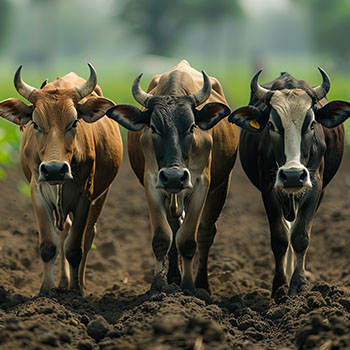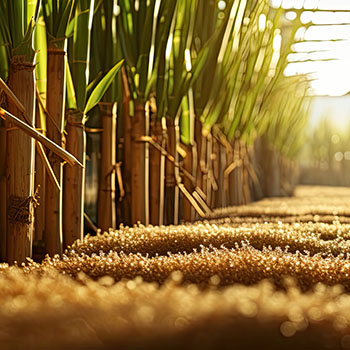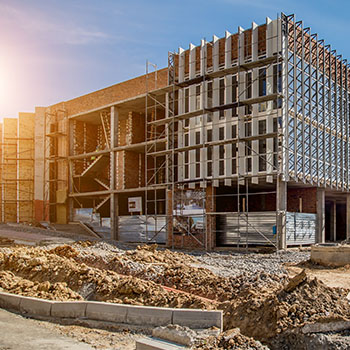ESSENTIAL CALCIUM-BASED SOLUTIONS
Graymont reliably meets customers’ current requirements while also innovating new calcium-based solutions and applications.
Graymont’s extensive calcium-based solutions and operational infrastructure support our customers’ vital industrial, construction, and agricultural processes and requirements. In addition to production of paper, glass, steel, and assorted other metals, applications include air and water purification as well as the extraction and processing of critical minerals.
Explore the markets and applications we serve by clicking on the icons below.











Agriculture
Graymont produces a wide range of products used in the agriculture sector. These products are used primarily as soil conditioners and as a vital mineral for the animal feed sector.
As soil conditioners, lime and limestone products are vital ingredients in any fertilizer programme and make a significant contribution to healthy and productive soils. They are used to manage soil pH, assist with crop establishment and manage issues such as aluminum toxicity. High magnesium dolomite products are available from some regions across the Graymont network.
Graymont manufactures a wide range of crushed and screened pulverized limestone for the animal feed sector. Products are available that are utilized across several livestock types including swine, beef, dairy, sheep (in some regions) and poultry.

Browse Agricultural Applications:
In some regions, large areas of farmed land are classified as hill country and traditional ground spreading vehicles are unsuitable when spreading soil conditioners like crushed limestone. Since the 1950’s in New Zealand, farmers have been applying crushed limestone via fixed wing aircraft or via helicopter to nurture and cultivate difficult to reach terrain.
Trials conducted in New Zealand over a three year period showed that the main pasture response to the limestone occurred after the initial application and then increased over time. Other pasture and soil related responses recorded included improved legume content, decreased pasture litter and an increase in earth worm numbers. Find out more about these lime trials in our additional resources below.
In response to customer demand and after two years of product development, Graymont developed a specific product for the aerial topdressing market known as AeroLime®. AeroLime® has been configured to meet agronomic expectations and to meet the guidelines laid out by the New Zealand Civil Aviation Authority.
AeroLime® is currently only available in New Zealand. Please refer to our related product page to view more information about AeroLime® or contact our sales team.
If certain soil types become acidic, this can create the ideal conditions for the release of soluble aluminum and manganese which can have a negative impact on plant growth. The consequences of toxic levels of aluminum and manganese include distortion of root tips in plants and will result in a reduction in rhizobia activity in legumes.
Preventing or correcting aluminum / aluminium toxicity can be complex, however getting the pH of the soil in the right zone is a significant step in the right direction.
Refer to our related product pages shown or contact our sales team to enquire about how our products can assist with soil fertility.
It is important for cropping farmers to manage inputs carefully to ensure yields are maintained and to produce quality crops profitably. Agricultural limestone is a key input and should assist cropping farmers to replenish lost calcium, maintain soil pH and in some cases improve soil conditions.
When applied at the appropriate rates, agricultural limestone (Aglime) can assist croppers to improve soils and consequently crops in the following ways:
- Correct pH and increase the mobility of some nutrients
- Reduce the incidence of aluminum / aluminium toxicity
- Helps to improve the physical condition and the health of the soil by stimulating microbial activity
- Replenish calcium that maybe lost during crop and fruit harvest activities (dolomitic limestone supplies both calcium and magnesium)
- Supply calcium that is vital for some crops during the establishment phase including rice and cocoa.
Magnesium naturally contained in dolomitic limestone is also vital for plant photosynthesis and is absorbed from interstitial soil pore water which can be a slow process and, in most cases, should be supported with maintenance applications of dolomitic limestone. Graymont can assist customers with both agricultural limestone and dolomitic limestone products.
In Malaysia, calcium is vital during establishment of some crops including rice and cocoa. Other crops require maintenance applications of calcium carbonate and rates will depend upon soil type, species propagated and crop cycles. Malaysian coastal soils are typically acidic and may affect crop and pasture production since the pH of the soil changes the availability of soil nutrients. Acid soils also create conditions for the release of aluminum and manganese that can have a negative impact on plant establishment and growth.
Quicklime or hydrated lime maybe an effective part of the solution. A thorough risk assessment should be conducted prior to handling quicklime and hydrated lime and all potential hazards appropriately managed and controlled. Please also refer to our product Safety Data Sheets.
For further information see our additional resources below or please contact our sales team to enquire about our products that support cropping and their availability in your region.
Lime materials such as quicklime or hydrated lime, can be used for the treatment of solids from dairy effluent ponds and for stabilizing soils for the construction of dairy effluent ponds.
Lime products can be applied when treating dairy effluent pond sludge for further processing or storage. Under the appropriate conditions lime will dewater sludge and correct sludge acidity which may assist with sludge decomposition.
When constructing dairy effluent ponds, lime products can improve the engineering properties of soils. There are essentially two forms of improvement: soil modification and soil stabilization. The use of lime can modify almost all fine-grained soils to some extent, and the most dramatic improvement occurs in clay soils of moderate to high plasticity.
Modification primarily occurs due to the exchange of calcium cations supplied by the hydrated lime. The clay surface mineralogy is altered as it reacts with the calcium ions to form cementitious products. This will result in a decrease in plasticity and a reduction in swelling and moisture-holding capacity, ultimately leading to improved stability.
For further information regarding applications and size grades, please refer to the related products under the Product Section of our website or please contact our sales team.
Graymont’s hydrated lime is a versatile material. The product’s high alkalinity can be used as part of a wider cleaning regime to improve sanitation and hygiene in New Zealand herd homes and animal pens.
Hydrated lime can be used to help control viruses, bacteria and parasites, as well as to absorb urine and significantly reduce odors.
Hydrated lime is highly alkaline and should only be applied after understanding and following all safety guidelines and practices, including using the correct personal protective equipment as noted on the product Safety Data Sheet. Hydrated lime should be applied carefully and only used where it will not come into direct contact with animals, for example beneath bedding materials. A thorough risk assessment should be conducted prior to handling hydrated lime and all potential hazards appropriately managed and controlled.
The practice of using hydrated lime in this setting relates to New Zealand only. Please contact our sales team to enquire how hydrated lime can assist in this application.
Agricultural limestone naturally enhances and maintains soil conditions by lifting the pH and assisting to cultivate soil health. Optimized soil pH also encourages worm and bacterial activity which in turn aerates the soil, improves drainage and promotes grass and clover growth. Healthy soil structure helps decomposition, assists with healthy root development and improves nutrient availability.
Soil testing is essential to assess pH and nutrient levels prior to applying agricultural lime and to gauge whether a farm is in need of capital or ongoing maintenance inputs of agricultural lime. Where a large increase in soil pH is required, capital application of agricultural lime is best. This is where lime inputs are far greater than the usual levels required for maintaining pH.
Agricultural limestone from the general market can vary in quality. At Graymont, we regularly monitor the manufacturing of our agricultural limestone at key points throughout the production process to ensure we meet the quality expectations of our customers.
Caution is Needed:
- Agricultural limestone is designed to be spread from ground spreading trucks only. It is not suitable for Aerial topdressing applications.
- Farmers need to be aware of the risks of grazing dry cows in late pregnancy on recently limed pastures
- If pregnant dairy cows (springers) ingest calcium through lime particles that are present on recently limed pastures, the cow’s metabolism tells it that it doesn’t need to mobilize calcium. After calving, the cow may “fall over” with the condition hypocalcemia or milk-fever. Graymont has products that may assist farmers to avoid milk fever. Refer to the Stock Feed Minerals section of our website under the Products menu.
For further information on agricultural limestone and its application refer to the additional resources section below or refer to the related products shown or contact our sales team.
Crushed and graded limestone products are an important component of a feed regime for poultry flocks. Graymont supplies several grades of quality grits and finely ground materials suitable for layers, broilers and breeders from various supply points across Graymont.
A number of factors should be taken into account when selecting a suitable limestone product such as bird species, life stage, feed delivery system and the calcium content of seasonal or standard feed regimes.
Poultry health products available in the regions we operate include:
- Australia – Calcimate® Grits
- Malaysia – CalCarb for broilers only
- North America – Supercal, Shell Mix, Calco, Zero Grind, Poultry Grit
- New Zealand – Calcimate® Grits, Drier Chip
Additional Resources
Pond preparation is critical to establish healthy and productive prawn rearing ponds. Routine sanitary measures can reduce disease incidence and keep pathogens at bay.
Graymont’s hydrated lime products can be used during pond transition procedures and to correct pond pH during growth cycles. Pond water that becomes acidic will place unnecessary stress on many prawn species and may result in lower growth rates.
Sources of acidity may include acid soil runoff and water with a high concentration of organic acids from jungles leaching or entering into prawn farming ponds. It is common practice to apply calcium carbonate or lime products to correct overly acidic ponds however these practices need to be conducted carefully and in consultation with experts to ensure pond water does not become overly alkaline.
Minerals are an important ingredient in a balanced diet for the majority of livestock types and Graymont pulverized limestone products are an essential part of the mineral mix.
Livestock types such as dairy cattle, swine, beef cattle, sheep, horses and poultry need calcium and the quantity of the mineral required depends on several factors such as breed, age of animal, forage type, introduced feed and the environment in which the livestock are raised.
CALCIUM AND THE DAIRY COW

Graymont can supply various forms of pulverized and graded limestone that are suited for various applications and mixing techniques in the stock feed mineral manufacturing sector. Products are available to suit formulations or blends including mineral pre-mixes, bulk mineral blends, pallet or granule production and lick manufacture. Graymont supplies a range of products specifically for poultry flocks. Further information is available on the Poultry Health section of our website.
Product Range
Graymont supplies several forms of crushed and graded limestone for stock feed manufacturers supplied under various brand names. These products are manufactured from high quality limestone and are tested to meet industry standards. Stock feed products available in your region include:
- Australia – Calcimate® Fine Limestone, Calcimate® Grits, Fine Ground Limestone
- Malaysia – CalCarb
- North America – Supercal®, Shell Mix, Poultry Grit
- New Zealand – Calcimate® Fine Limestone, Calcimate® Grits, Drier Chip
Please contact our sales team to enquire about pulverized limestone for stock feed minerals and availability of these products in your region.
Construction Materials
Graymont manufactures a wide number of essential materials for various construction applications including roading materials, stabilization binders, fillers and adhesion agents for asphalt.
The product range includes heavy duty materials for road construction such as road base, aggregates and selected fill.
Products to assist with erosion control such as rip rap and shot rock are available at some Graymont sites.
Graymont has substantial technical knowledge and capability supplying lime binders for soil stabilization and fill drying. We also manufacture hydrated lime and limestone fillers for asphalt manufacture.
For fine limestone products with specific sizing and chemical specifications please refer to the Pulverized Limestone section of the products section of our website.
Please contact our sales team to enquire about how we can help you with your construction needs.

Browse Construction Applications:
Acid sulphate soils can cause damage to concrete and reinforcing steel in situ. Graymont can supply products that are commonly specified to neutralize and condition acid sulphate soils prior to sub surface construction work taking place.
Important factors to consider when selecting the correct neutralizing agent include; safety during application, receiving environment for any water runoff, buffering capacity, solubility and purity of the material. Certain types of limestone, quicklime and hydrated lime may be used as neutralizing agents for treating acid sulphate soils. The application of these materials is a technical area and customers should engage a qualified professional to ensure the soils are assessed correctly and mix designs and techniques are appropriate for the situation and soil conditions present.
Contact our sales team to enquire about our neutralizing products.
Additional Resources
- Guidance Materials for acid sulfate soils, Queensland Government, Australia, 2004.
- Treatment and management of soil and water in acid sulfate soil landscapes, Government of Western Australia, Department of Environment Regulation, 2015
Acknowledgement
Graymont would like to acknowledge the Queensland and Western Australian State Government for access to web content.
Aggregates are vital for common construction applications including residential subdivisions, highways, driveways, parking lots, sidewalks and bridges.
Several Graymont quarries provide quality stone and crushed stone products to help meet the aggregate needs of their respective regions. These materials are produced to rigorous internal standards or external standards as detailed by the specifying agency in the region where they operate.
The product range includes coarse size fractions which can be as large as 100mm and finer graded aggregates. The exact size range available will vary depending on Graymont site. For customers that require aggregates with certain chemical properties please refer to the Products section of our website. For specialized applications and aggregate properties please enquire with our sales team.
In some cases, Graymont can supply finer fractions of aggregates for manufacturing coatings, glass, wallboards, vinyl, concrete blocks, roofing tiles and asphalt shingles. Further information about finer products can be found under Pulverized Limestone on the Products section of our website.
Graymont limestone products can be employed in applications to assist with flood prevention, watercourse management and coastal erosion.
Various products are available including Rip Rap/Shot Rock and Armour Rock for the protection of shorelines, steep slopes, stop banks and bridge foundations. Suitable size grades for gabion baskets or wire mattresses are available at some sites by arrangement. Please contact our sales team to enquire about availability in your region.
Fill materials are available from time to time from our limestone quarries.
Fill products we can supply are often a mix of limestone with variable percentages of soil and clay. Grade and availability will vary depending on the quarry works being carried out at the time. Please contact our sales team enquire about the composition and availability of fill materials.
Limestone pebble in various sizes can make a popular and vibrant landscaping material. Natural limestone rock can be a low maintenance and complementary addition to any garden landscape.
Currently landscaping products including pebble and some paving stones are only available in New Zealand through select landscaping supply yards. Please note that these products are not available for supply direct to public from our quarry sites. Please contact our sales team to enquire about a stockist near you.
Many roading authorities and state transportation departments have found that incorporating hydrated lime and limestone fillers into hot mix asphalt can add years to the life of a highway.
Hydrated lime improves several chemical and adhesion properties of bitumen and is a viable alternative to other traditional binders such as fly ash.
According to the National Lime Association, some of the key technical benefits of hydrated lime in asphalt include:
- Hydrated lime reduces stripping as it reacts with highly polar molecules that would otherwise react to form water soluble soaps that promote stripping.
- Hydrated lime promotes formation of insoluble salts that no longer attract water. Unlike most mineral fillers, hydrated lime is chemically active rather than inert. It reacts with the bitumen, removing undesirable components at the same time that its tiny particles disperse throughout the mix, thus making the pavement more resistant to rutting and fatigue cracking.
- Hydrated lime reduces the rate of oxidation and aging of the pavement. Hydrated lime reduces cracking as lime particles form polar molecules that intercept and deflect cracks. Essentially the polar molecules increase the volume of lime particles and assist to prevent cracks from growing.
Graymont also commonly supplies finely ground limestone filler for asphalt manufacturing applications as a supplement or replacement for bag house dust. Various sizes are available and customers can choose from several ground limestone filler products available.
Graymont is able to supply hydrated lime and limestone fillers for asphalt manufacturers from a number of Graymont sites across our network of plants. In some cases, we are able to offer storage and logistics solutions for mobile asphalt plants by prior arrangement.
Contact our sales team to enquire about our products for the asphalt industry.
Quicklime and hydrated lime are often used in construction applications to chemically modify and stabilize fine grained soils and for drying wet soils. Treatment of the soils with lime helps provide a sound base for the construction of roads, wind farms, pipe trenches, stop banks and numerous other applications.
Lime can be used almost all year round for effective soil drying and soil stabilization using lime can occur almost all year round. In a road construction context, the correct application of quicklime or hydrated lime can improve load bearing performance, optimize moisture content, pavement durability and assist to avoid costly delays in project timelines.
There are essentially two types of soil improvement when using either quicklime or hydrated lime:
- soil modification
- soil stabilization
The use of lime can modify almost all fine-grained soils to some extent and the most dramatic improvement occurs in clay soils of moderate to high plasticity.
Modification primarily occurs due to the exchange of calcium cations supplied by the lime. The clay surface mineralogy is altered as it reacts with the calcium ions to form cementitious products. This will result in a decrease in plasticity and a reduction in swelling and moisture-holding capacity, ultimately leading to improved stability.
Soil stabilization occurs when the proper amount of lime is added to a reactive soil to initiate the development of cementitious products. Stabilization differs from modification in that a significant increase in strength is developed over the longer term through an on-going pozzolanic reaction. This reaction results in the formation of calcium silicate and calcium aluminate hydrates as the calcium from the lime reacts with the soluble forms of aluminates and silicates solubilized from the clay mineral surface. This reaction can begin quickly and is responsible for some of the effects of soil modification. The full-term pozzolanic reaction can continue for a long period of time, often for many years resulting in sustained strength gains and long term durability of the lime stabilized soils.
Graymont quicklime is supplied in different size gradings from finely ground to coarser pebble quicklime material. Hydrated lime is also available for other roading applications including foamed bitumen stabilization.
Contact our sales team to enquire about our soil stabilization products.
Acknowledgement
Graymont would like to acknowledge and thank the National Lime Association for access to web content. Graymont would also like to thank Hiway Stabilizers for the use of images.
Selected limestone rocks and dimension stone are available from certain Graymont sites. These products can be used for landscaping, exterior and interior feature rock walls and building restoration.
Please refer to the related product pages on our website for more information about our product range and availability in your region.
Base course, sub-base and other crushed and graded structural limestone materials are available for various pavement construction applications below ground.
Where required, our products are manufactured to meet industry or local specifications. Surface or top courses are also available depending on the Graymont site and location of the works.
In some cases, it may be more economic and prudent to treat the existing failed road base with lime rather than replace with premium materials. For stabilized base courses or subbase please see the relevant pages on Lime in Soil Stabilization for further information or please contact our sales team to enquire how Graymont can assist you with your project.
Environmental
Lime is increasingly being used as a tool to assist in addressing a number of complex environmental issues and challenges.
Acid rain reduction, environmental rehabilitation, water and sewage treatment, agriculture, oil and gas production, and power generation are among the long and growing list of crucial sustainability-related applications for Graymont products.

Browse Environmental Applications:
Environmental remediation initiatives employ lime in a multitude of different applications. This section outlines a few examples of how lime is being widely used as the reagent of choice when responding to environmental problems.
Lime is a cost-effective reagent for the treatment of animal wastes. This is becoming increasingly important as the feedlot industry consolidates and transitions to large-scale feeding operations that produce significant volumes of waste.
Lime can also be used for effective treatment of sewage biosolids, including municipal wastewater, as well as industrial sludge, petroleum wastes and acidic drainage from active or abandoned mine sites.
Lime is often employed to treat hazardous wastes. Lime stabilizes most metals by converting them to more chemically stable forms that are less likely to leach. In addition, when added to soil, lime can be a very effective way to solidify material and prevent future discharge of hazardous wastes.
There are many other applications for lime in environmental remediation projects. Contact our sales team to enquire how lime can help achieve positive environmental outcomes.
Lime products are utilized frequently for the treatment of industrial water prior to discharge and can deliver multiple benefits.
The main applications of lime in industrial wastewater treatment include pH correction, heavy metal management, neutralizing acidic waters, softening water chemistry, precipitation of dissolved materials and water clarification when used with flocculants.
Industrial wastewater applications are highly specialized and qualified professionals should be consulted when designing and implementing a treatment system. Graymont has experience supplying quicklime and hydrated lime for treatment systems and can provide further support for specific applications.
Please contact our sales team to enquire about our product range for wastewater treatment applications.
Quicklime and hydrated lime products can be used to assist mining companies manage liquid discharges from active, inactive or rehabilitated mine sites.
Lime is often employed for pH correction and the management of acid mine drainage (AMD) which commonly evolves from sulfur bearing minerals when they are exposed to and react with air and water. The appropriate application of lime will also assist mining companies to contain and manage any entrained metals in surface waters. Lime addition may also assist to further clarify water utilizing the coagulation properties of hydrated lime which also thickens sludges and improves the ability for the operator to stack and store the materials it is applied to.
For further information refer to Tailings Treatment and Storage in the Mining section of our website.
Environmental remediation initiatives often employ lime in a multitude of different applications. Under managed and controlled conditions, lime can be used in the effective treatment of industrial sludges, sewage biosolids, petroleum wastes and acidic drainage from active or abandoned mine sites.
Adding lime and controlling pH will lock up soluble metals and convert those metals to a more chemically stable form that is less likely to leach. In addition, when added to soils and sludges, lime can be a very effective way to solidify and dewater materials and manage pathogens of various types. In recent times, lime is being trialed as an aid to improve soil mechanical properties for oil and diesel contaminated soils.
Please contact our sales team to enquire how Graymont can assist you with specific contamination challenges and provide advice on lime handling solutions.
Food Industry
Lime and limestone products have many uses across the food industry in various applications such as brine manufacture, vegetable preservation, tortilla production, sugar refining and as a compound to absorb CO2 during the storage of fruits and vegetables.
Graymont’s joint venture partner in South America, Grupo Calidra manufactures high quality hydrated lime for use as a food processing aid. The product is marketed under the Nixtacal brand. For further information please contact our sales team.

Browse Food Applications:
Lime and limestone products are used frequently in the food industry in applications such as brine manufacture, vegetable preservation, tortilla production and as a compound to absorb CO2 during the storage of fruits and vegetables.
Food Ingredient or Additive
Grupo Calidra, Graymont’s strategic partner, is able to provide high-purity hydrated lime to the food industry. Sectors using this food-grade product include tortilla and corn chip makers. Corn is first soaked in milk-of-lime before its conversion to cornmeal during the production of tortillas. To purchase high-purity hydrate for your food application, please contact Grupo Calidra.
Controlled Atmosphere Storage
Graymont is also involved in the controlled-atmosphere storage of fruits and vegetables. In this application, bags of hydrated lime are placed on racks in a storage room or warehouse to absorb the carbon dioxide (CO2) that exudes from the ripening fresh produce. In this manner, a higher ratio of oxygen (O) to carbon dioxide (CO2) is maintained, permitting vegetables and fruit to be stored fresh for much longer periods. This reduces waste, improving sustainability outcomes.
When placed in close proximity to the produce, the CO2 easily penetrates the multiwall paper bags the lime is stored in and into the lime itself. For apples, lime consumption averages about 1 to 1.5 pounds per bushel. Pears, plums and tomatoes have also been stored this way in Canada and the Northeastern United States, Oregon and Washington. In California, this technique is commonly employed when storing lettuce.
Hydrated lime is essential to the production of sugar from both sugar cane and sugar beets. It is also used to purify sugar derived from other sources, such as maple or sorghum.
Sugar cane and sugar beets are harvested and processed with water to form raw juice, which has low pH and contains dissolved impurities. Hydrated lime is added to the juice to raise the pH and to react with the impurities to form insoluble calcium organic compounds that can be removed. Excess lime is removed by carbonation or by the addition of phosphoric acid. This process may be repeated several times depending on the purity of final product required.
Graymont assists sugar millers and refiners with products across all regions we operate in including Philippines, Malaysia, Australia, New Zealand and the Pacific Islands.
Please contact our sales team to enquire about how we can assist with this application.
Glass Manufacturing
A commercially important property of lime is its ability to form solutions with silicates.
When lime is heated with silica sand (SiO2) and sodium carbonate (Na2CO3), a solution is formed that does not crystallize when cooled. Instead, it hardens to an amorphous, clear and nearly colorless solid – namely, glass.
Because it is a mixture and not a pure compound, glass does not have a distinct melting point; it gradually softens as it is heated. Therefore, it can be molded and blown into many useful shapes. The production of container glass from lime is another ancient use of lime.
A range of chemical limestone, dolomite and lime product types are available for general applications and achieving various properties such as flux capture, color, managing viscosity, improving durability and chemical resistance.
Refer to the related products shown or contact our sales team to enquire about our lime products for the glass manufacturing industry.

Browse Glass Applications:
Lorem ipsum dolor sit amet, consectetur adipiscing elit, sed do eiusmod tempor incididunt ut labore et dolore magna aliqua. Ut enim ad minim veniam, quis nostrud exercitation ullamco laboris nisi ut aliquip ex ea commodo consequat. Duis aute irure dolor in reprehenderit in voluptate velit esse cillum dolore eu fugiat nulla pariatur. Lorem ipsum dolor sit amet, consectetur adipiscing elit, sed do eiusmod tempor incididunt.
Mining
The world’s ability to sustain its population depends on the many essential products provided by the mining and metals industry. From the roads we drive on to the satellites that power global communication, mined materials—especially critical minerals—are the backbone of modern infrastructure, technology, and daily life.
Consider a world without advanced manufacturing, agriculture, mass-scale energy production—or the critical minerals essential to enabling them.
Virtually all of our needs must be dug from the earth, grown in the soil, or taken from the sea.
It is estimated, for instance, that we need to produce more than 40,000 pounds of new minerals a year for every person living in the United States. As the global population grows, increased demand for electronics, medicine, telecommunications, transportation and housing will accelerate the worldwide demand for minerals.
Limestone is one of those minerals. Aside from the many vital uses to which lime itself is put, limestone and quicklime products are used to help extract many of the other minerals the world relies on now and in the future.
Lime and limestone products are used for various mining applications—including the extraction and processing of critical minerals—such as coagulation, flotation and recovery, milk of lime or lime slurry solutions, tailings treatment, acid mine drainage and storage activities.

Browse Mining Applications:
In mining applications, lime is used as a coagulation aid in thickeners and clarifiers. By adjusting the pH, lime creates the optimum conditions for flocculation and coagulation to occur, supporting the recovery of valuable resources—including critical minerals—and assisting other reagents in performing their function.
With an increase in pH, soluble calcium will become more mobile and modify fine particles in a way that improves settlement. This modification can also reduce the need for additional flocculants while improving the density and strength of the flocs.
A consistent and reliable milk of lime solution is required for coagulation purposes which can be manufactured using either hydrated lime or slaking quicklime on site. Graymont can assist customers to achieve the desired product and outcomes they require.
Graymont manufactures carefully sourced and graded limestone fines for application in underground coal mines to assist miners in mitigating the risk of coal dust explosion, supporting the safe extraction of energy resources and critical minerals.
Stone Dust and Rock Dust products are made to meet relevant industry specifications and are available in certain packaging types across the Graymont network.
Both quicklime and hydrated lime are widely used in flotation and hydrometallurgical processes to aid the recovery of valuable minerals and metals—including critical minerals such as gold, silver, copper, zinc, nickel, and lead-bearing ores.
Lime is used extensively in the recovery of gold and silver. Run-of-mine, milled, autoclaved or roasted ores are combined with lime and a cyanide solution. The cyanide dissolves the gold and silver. Lime is vital to maintain the correct pH to keep cyanide in solution, keeping it in the liquid phase and preventing the formation of dangerous hydrogen cyanide gas and associated loss into the atmosphere.
There is nuance and skill involved in using lime to best effect, and Graymont’s technical know-how can assist customers to define optimum lime slaking and mixing solutions to suit their needs.
Please contact our sales team to enquire about our lime products for flotation and recovery processes.
Milk of lime solutions (MOL) or lime slurries are available for sectors of the mining industry where maintaining pH is required for flotation, process water, and/or wastewater—especially in operations involving the extraction of critical minerals.
Graymont has experience assisting customers in producing lime slurries and with the maintenance and delivery of milk of lime reagents or solutions. Quicklime and hydrated lime, as well as ground limestone, are commonly used in concentration plants in the form of lime slurries and milk of lime products. In many cases, these products are more efficient and cost-effective in comparison to other alkaline slurries and technologies.
Lime plays two important roles in the production of soda ash and sodium hydroxide.
One of the major sources of soda ash (Na₂CO₃) and caustic soda (NaOH) in North America involves the refining of naturally occurring trona ores. These ores are mixtures of carbonates, bicarbonates and impurities that must be refined to produce marketable products. Combining the bicarbonate-containing liquid with lime is one of the processes used to convert the bicarbonates in the trona to carbonate form.
By increasing the lime dosage, either the trona or soda ash can be converted to caustic soda, a higher-value product. In this process, lime is first slaked and converted to calcium hydroxide (Ca(OH)₂). Next, the lime slurry is combined with soda ash (Ca(OH)₂ + Na₂CO₃). This yields caustic soda and limestone (2NaOH + CaCO₃). The limestone from this reaction can be recycled to make lime, which can then be reused for other purposes.
Soda and caustic-soda solution are essential ingredients in an array of industrial operations. These include pulp and paper production, glass making, water treatment, flue-gas treatment, the manufacturing of soap, detergents and bleach, the refining of petroleum products and alumina, and the extraction and processing of critical minerals—among many other uses in the chemical-processing and mining industries.
Graymont can assist customers to treat tailings pond materials and discharge waters, thus improving the handling and reuse options of both solids and liquids.
Where tailings contain fine particles or clay, lime products can be used to improve dewatering and recoverable process water. This treatment can also result in improved handling, material strength, and a stackable tailings product that can be used in landform reclamation—including operations involving critical minerals.
These benefits can be obtained by using the right mix of lime treatment coupled with other technologies, leading to a cost-effective, faster pathway for reclamation outcomes. Lime treatment will also immobilize contaminants such as heavy metals and, in some cases, organic compounds in discharge waters, and neutralize any acid mine drainage (AMD) present.
Graymont has significant technical expertise and can assist customers to unlock substantial value in tailings treatment and reclamation. For more information, see the additional resources below or contact our sales team.
Mortars & Plasters
Lime is a truly versatile material widely used in the construction of buildings. It can be utilized in masonry applications as a component of mortar or of the masonry unit, exterior (stucco) and interior plaster systems. Lime products may also be a component of mixes and mortars used in applications such as Hemp and Strawbale construction techniques.
Lime has been used in building construction for thousands of years to create durable mortar and plaster. Lime putty was originally used for such applications, however most modern applications now utilize hydrated lime. Dolomitic Type S hydrated lime is preferred for applications in North America, due to its exceptional water-retention capability and proven performance.
Lime provides benefits to mortar and plaster in both the plastic and hardened state. In the plastic state, lime can enhance workability and water retention. In the hardened state, lime products react with carbon dioxide to regenerate calcium carbonate or limestone. This is a slow, gradual process that increases the hardness of the finished surface and allows for the closing of hairline cracks by a process called autogenous healing.
Since initial strength is needed in most applications, additives such as gypsum, cement or pozzolans are mixed with lime in construction applications. Lime can react with pozzolanic materials in the mortar or plaster to produce a cement-like product. The strength of lime-based mixes can be modified according to the needs of the particular application. This is particularly beneficial in restoration applications, where low strengths and high vapor permeability are required.

Browse Mortar & Plaster Applications:
Global demand continues to grow for low carbon materials and low impact construction techniques. One such construction technique which has attracted considerable interest in recent years is the Hemp Lime construction technique.
Developed originally in France, hemp shiv and lime materials are used primarily for wall construction in residential homes where constructors seek to obtain several benefits such as thermal efficiency, low density and CO2 absorption.
Building on our expertise and our range of products in the mortars and plasters sector, Graymont has developed a high purity pre-blended hydraulic lime for the hempcrete and strawbale construction market.
Marketed under the Niagara® brand, these products have been proven to work effectively for this application. When used correctly and applied under the right conditions Niagara® products provide several benefits both during the construction process and long after, including the following:
- When in wet phase these materials have high plasticity, workability and high water retention.
- As a lime-based mortar, Niagara® products provide high water vapor transference. Note that this is especially important in non-portland cement-based applications.
- It is well known that recarbonation effects occur for many years after the initial construction phase as water slowly evaporates from the lime and is replaced with CO2.
For further information please refer to the Niagara® product pages on the Products section of our website or contact our sales team to enquire about Niagara®.
Early mortars were produced by calcining limestone in a kiln and slaking it for long periods of time in water, creating lime putty. Now several types of hydrated lime products are available for masonry applications.
This was necessary to enhance the workability and soundness of the mortar. Locally available sand was added to the slaked lime putty to create lime mortar. These mortars were used to construct masonry walls containing brick, block or stone. The lime in these mortars absorbed carbon dioxide from the air to convert it back to its original chemical form (limestone). However, his process was slow and further inhibited in underwater applications.
To increase the speed of construction, pozzolans such as brick dust and volcanic ash were added to lime. Natural cements and hydraulic lime products were produced by calcining limestone with high silica content or with clay. These products would develop strength without the addition of pozzolans and would also set under water.
Combinations of lime and cement were developed using alternate letters of the phrase MASON WORKS. For instance, Type M is the strongest mortar with the least lime, and Type K is the weakest with the most lime. In these formulations, lime enhances workability, water retention and bond strength. The carbonation of lime also enhances long-term strength development.
Product Application
There are several types of hydrated lime products defined for masonry applications in the ASTM standard C207 (Standard Specification for Hydrated Lime for Masonry Purposes). Graymont manufactures products in each of the below types:
Type N, or Normal hydrated lime, products are only partially hydrated and/or have poor workability. Additional additives and/or long soak periods are required for these products to perform effectively in masonry applications. ASTM C270 (Mortar for Unit Masonry) specification states that if a portland cement-lime blend contains Type N hydrate, the blender must show through performance testing that the Type N product is not detrimental to the soundness of the mortar.
Type S, or Special hydrated lime products, are a combination of calcium and magnesium hydroxides. In building applications, Type S dolomitic hydrated lime products have high hydration levels and controlled plasticity (water retention). This allows for minimal soak periods prior to application.
Type SA hydrated lime products can contain air entrainment additives. Air-entrained lime products must have a minimum air entrainment level of 7% and a maximum air level of 14%.
Modern cement-lime mortars can be specified by the properties (air content, compressive strength and water retention) of the mortar or by volume proportions of cement, lime and sand, according to ASTM C270 (Standard Specification for Unit Masonry) requirements.
Graymont Manufacturing
Graymont’s manufacturing plants for building-lime products are located in Genoa, OH and Eden, WI. Graymont masonry products offer exceptional plasticity for increased water retention and workability in mortar applications.
Super Limoid® Type S, Miracle® Type S and Mortaseal® Mason’s Lime are fine-grind, white, high-purity dolomitic limes, fully hydrated for immediate use. Both of these products comply with ASTM C207 standards for a Type S hydrated lime. When properly combined with portland cement, they create a lime mortar that offers excellent bond strength, water retentivity and weather resistance at an economical cost. These products are available in 50-lb. (22.5-kg) bags or bulk.
Super Limoid® Type SA, Miracle Type SA and Bondcrete® Stucco Lime are air-entraining hydrated lime products that are pressure-hydrated for immediate use in stucco applications. These products meet the requirements of ASTM C207 for a Type SA hydrated lime. When properly combined with portland cement and sand, they create a stucco that provides performance, economical results and ageless durability. Type SA hydrated lime should not be used in smooth coat plaster applications. These products are available in 50-lb. (22.5-kg) bags or bulk.
Niagara® Mature Lime Putty is a high-purity dolomitic lime putty fully slaked and screened for immediate use. Niagara Lime Putty is slaked for a minimum of two months and complies with ASTM C1489. This product is available in 45-gallon drums or three-gallon pails.
Graymont manufactures two blended hydraulic lime products, Niagara® PHL 3.5 and 5.0. These products have been designed for use in restoration applications and meet the requirements of ASTM C1707 (standard specification for pozzolanic hydraulic lime for structural purposes). They can be used in repointing, plastering, and grouting applications on historic or contemporary projects. These products are perfect for restoration applications where ordinary Portland cements or masonry cements are not compatible with the existing masonry system. PHL 3.5 and 5.0 are available in 50-lb. (22.5-kg) bags.
Evidence of the use of lime in plastering applications dates back to the construction of the Egyptian pyramids about 4000 BC.
Plastering methods were refined by the Greeks and Romans. Early plaster systems could contain lime, gypsum, marble dust, fibers and sand in up to three coats.
Modern plasters can contain portland cement or gypsum products. Exterior plasters, often called stucco, normally contain portland cement because of its low solubility in water. Interior plasters usually contain gypsum. The advantages of these plasters in modern construction include the following:
- Lime is cementitious – Hydrated lime absorbs carbon dioxide from the air to chemically convert to limestone. This creates a hard-finished surface and enhances long-term durability by sealing hairline cracks.
- Type S Hydrated Lime is water-retentive – This property enhances the workability (plasticity) of the plaster as it is applied to walls. Since water is needed for gypsum or cement to set, the water retentivity of the lime maximizes the cementitious reaction of these materials.
Product Application
Prior to 1900, lime was used for all three coats of the plaster system. Lime-based basecoats typically contained a small amount of Keene’s cement or portland cement to assist with the development of initial strength. These plaster formulations often included hair or fibers as well.
Modern interior plaster can be applied in one to three coats. Basecoats are normally made with gypsum-based products, however lime is an important ingredient in the final coat, often called the “finish coat.” Common mix designs for interior plaster can be found in ASTM C842 (Specification for Application of Interior Gypsum Plaster). Interior plasters can either be sand finished or smooth troweled.
Exterior plaster can also be applied in up to three coats. Exterior plasters or stucco can be made with portland cement, Type S hydrated lime and sand blends. Proportions of cement and lime are varied with each layer to provide a strong base and a flexible finished surface. Recommended mix designs for exterior stucco can be found in ASTM C926 (Specification for Application of portland cement-based plaster).
In both applications, hydrated lime enhances the workability as well as the durability of the plaster. The fine particle size of lime products helps in the retention of water in the plaster. This enhances workability while providing water for proper gypsum or cement hydration to occur. Gypsum or portland cement provide the initial set and early hardness for both types of plaster. Hydrated lime absorbs carbon dioxide from the atmosphere to chemically change it into limestone. This reaction increases the strength of the plaster over time.
Graymont Products
Graymont building lime products are manufactured at the Company’s plant located in Genoa plant in Ohio. This area of Northwest Ohio is considered to have one of the best deposits of dolomitic limestone for the production of finish lime products in the world. Graymont Dolime (OH) Inc. offers several different types of lime products for plastering applications.
Ivory® Finish Lime and Snowdrift® Finish Lime are products that are autoclaved for immediate use with gauging plasters and portland cement, without soaking or slaking. These Type S hydrated lime products offer the high plasticity, tight bonding and smooth troweling sought by plasterers.
Grand Prize® Finishing Lime is a single-hydrate (Type N) product designed for use with gypsum or portland cement. It requires a minimum of 16 hours of soaking to develop sufficient hydration for use. Grand Prize features high plasticity and exceptional body for smooth application.
Bondcrete® Stucco Lime is an air-entraining hydrated lime that is pressure-hydrated for immediate use in stucco applications. Bondcrete meets the requirements of ASTM C207 for a Type SA hydrated lime. When properly combined with portland cement and sand, it creates a stucco known for its superior performance, economical results and ageless durability. Bondcrete Stucco lime should not be used in smooth-coat plaster applications.
Niagara® Mature Lime Putty is a high-purity dolomitic lime putty fully slaked and screened for immediate use. Niagara Lime Putty is slaked for a minimum of two months and complies with ASTM C1489 (standard specification for lime putty for structural purposes). This product is available in 45-gallon drums or three-gallon pails.
Evidence of the use of lime in construction dates back to 4000 BC and the construction of the Egyptian Pyramids.
Historically, lime was used in a variety of ways in construction, including whitewash, mortars, plasters, and stucco/renders. Lime for these applications was produced by burning limestone in small, hillside kilns near the jobsite. Quicklime produced by these kilns was placed into pits where water was added. Slaked quicklime was soaked for long periods of time to ensure suitable working characteristics for the mortar.
Today, lime-based mixes are the logical choice for restoring historic buildings for several reasons:
- High-lime-content mortars and plasters are compatible with historic materials. For example, buildings over 100 years old may have been constructed by hand-pressed brick that have low compressive strength. If walls containing these materials are pointed with a mortar with high cement content, the masonry units can be damaged when the building expands and contracts.
- Mortars, plasters and stuccos having high levels of lime are vapor-permeable. This reduces the potential for damage from water buildup in the wall.
- Use of lime-based products can replicate original building practices.
Graymont produces several different types of hydrated lime products suitable for restoration projects including the following:
Lime Putty
Niagara® Mature Putty is a high-purity dolomitic lime putty, fully slaked and screened for immediate use. The putty is made from the purest dolomitic limestone available. The stone deposit was discovered in 1890 in northwest Ohio, USA, and is said to be the purest in the world. Niagara® is cured for a minimum of two months to develop excellent working characteristics.
Niagara ® Mature Lime Putty complies with ASTM C1489 (Standard specification for lime putty for structural purposes). The product is available in 45-gallon drums or three-gallon pails.
Type N Hydrate Lime
GRAND PRIZE® Type N Finishing Lime is a single-hydrated (Type N) product made from high-purity dolomitic limestone. Type N hydrated limes were popular in the first half of the 20th century. Similar to historic lime applications when lime was soaked for long periods of time before use, this product requires a minimum of 16 hours soaking to develop sufficient hydration. Grand Prize complies with ASTM C206 and ASTM C207 Type N requirements. Available in 50-lb. (22.5-kg) bags.
Type S Hydrated Lime
IVORY® Type S Finish Lime is made from high-purity dolomitic limestone, autoclaved for immediate use with gauging plasters without soaking or slaking. IVORY® Finish Lime is especially formulated to be compatible with standard gauging plasters. Use IVORY® Finish Lime with high-strength gauge, Keenes Cement, and all other manufacturer’s gauging plasters for high plasticity, tight bonding and the smooth troweling sought by plasterers. IVORY® Finish Lime permits a thin finish coat, while the gauging plaster provides initial set and early hardness to minimize shrinkage of lime, for either smooth-trowel or textured sand-float interior finishes. Walls become exceptionally hard and crack-resistant while maintaining their long-lasting beauty. This product complies with ASTM C206 Type S and Federal Specification SS-L-351 B Type F. It also complies with ASTM C207 Type S requirements. Available in 50-lb. (22.5-kg) bags.
Graymont’s Genoa, OH and Eden, WI facilities manufacture Type S Mason’s lime products under three brand names, Mortaseal®, Miracle® and Super Limoid S®. These products are fully hydrated and are available for immediate use. When properly combined with cement and sand, they create a lime mortar having superior performance and ageless durability. Due to the low air content of these products, Mortaseal® and Super Limoid S® provide exceptional bond strength in mortars. Both Mortaseal® and Super Limoid S® comply with ASTM C207 (Hydrated Lime for Masonry Purposes) specifications. These products are available in durable three-ply, weather-resistant poly-lined 50-lb. (22.5-kg) bags, 2000 lb supersacks or for delivery in pneumatic bulk tankers.
Type SA Hydrated Lime
Graymont’s Genoa, OH and Eden, WI facilities manufacture Type SA Mason’s lime products under the following brand names Bondcrete®, Miracle SA® and Super Limoid SA®. These products are fully hydrated and available for immediate use. Type SA Mason’s lime products contain an air entrainment additive that enhances workability and water retention of lime mortars. For stucco applications, air entrainment improves the sand carrying capacity (yield), workability and pumpability of the mix. Both Bondcrete® and Super Limoid SA® comply with ASTM C207 (Hydrated Lime for Masonry Purposes) specifications, Type SA. Both products are available in durable three-ply, weather-resistant and poly-lined 50-lb. (22.5-kg) bags or for delivery in pneumatic bulk tankers.
Hydraulic Lime
Graymont manufactures two blended hydraulic lime products, Niagara® PHL 3.5 and 5.0. These products have been designed for use in restoration applications and meet the requirements of ASTM C1707 (Standard specification for pozzolanic hydraulic lime for structural purposes). They can be used in repointing, plastering, and grouting applications on historic or contemporary projects. These products are perfect for restoration applications where ordinary portland cements or masonry cements are not compatible with the existing masonry system. PHL 3.5 and 5.0 are available in 50-lb. (22.5-kg) bags.
Hydrated lime or lime putty can be blended with water to produce whitewash.
Whitewash is an inexpensive coating that historically has been used to decorate, protect and sanitize a wide range of materials. Whitewash typically has a bright white color. However, lime-fast pigments, can be added to provide a broad range of colors. The principal ingredients in whitewash are hydrated lime and water. Hydrated lime absorbs carbon dioxide from the air to convert back to limestone. This reaction provides a protective layer over the whitewashed surface. The pH of hydrated lime also helps to sanitize surfaces.
As well as being inexpensive to produce, whitewash can be used on both wood and masonry surfaces in building construction. The white color of the coating will also reflect light and subsequently reduce the absorption of heat on substrates such as roof tiles in hotter climates.
Graymont Spray Lime is a dolomitic hydrated-lime product that meets the criteria of ASTM C206 for Finishing Hydrated Lime. The fine particle size of this product contributes to excellent dispersal and coverage in whitewash formulations. Graymont Spray Lime is available in 50-lb. (22.5-kg) bags.
Municipal Water Treatment
Lime is used to condition and treat many types of water and solids across the sector including potable water, wastewater and biosolids. Lime can also assist to balance mineral content of water supplied from desalination plants.
Lime is used by many municipalities/councils to improve liquid phases including to soften water, adjust pH, improve coagulation and purity remove impurities such as heavy metals and tannins.
Lime is also commonly used to dewater biosolids, control pathogens, minimize insect vectors and neutralize odors. Graymont can assist customers with the appropriate product and provide assistance with application methods.
Further explanation and technical information can be found in the sections on Potable Water, Wastewater and Biosolids treatment of our site.

Browse Water Applications:
Lime products including quicklime convey a number of benefits when treating biosolids including flocculation, pH correction, metal precipitation, heating effect and dewatering functionality.
Dewatering – Dewatering biosolids with quicklime has potential to reduce operational costs in several areas including lower chemical reduction costs, reduced polymer usage, reduction in wash water required, reduced cartage costs and reduced capital costs for solids storage.
Heating effect – As quicklime comes into contact with sufficient moisture it will hydrate and when this occurs a exothermic reaction generating heat and can effectively pasteurize the solids.
Odor Management – The solubility of hydrated lime provides free calcium ions, which react and form complexes with particularly odorous sulfur species such as hydrogen sulfide and organic mercaptans. Research shows that as a result of this reaction, the offending compounds are destroyed and not just masked or hidden.
Additional Resources
Graymont carefully monitors its lime production processes to provide products that meet the required specifications.
Please refer to the related products shown or contact our sales team to enquire about biosolids treatment.
Lime is essential for the potable water treatment sector where it plays a role in making water safe to drink by softening pH and assisting to remove heavy metals and other impurities.
The main benefits associated with lime in potable water treatment are as follows:
pH Adjustment/Coagulation – Hydrated lime is widely used to adjust the pH of water to prepare it for further treatment. Lime is also used to combat “red water” by neutralizing the acid water, thereby reducing corrosion of pipes and mains from acid waters. The corrosive waters contain excessive amounts of carbon dioxide. Lime precipitates the carbon dioxide to form calcium carbonate, which provides a protective coating on the inside of water mains.
Water Softening – Hydrated lime is used to remove carbonate “hardness” from the water. Hardness caused by other calcium and magnesium salts, called noncarbonate hardness, is generally treated by means of the lime-soda process, which entails the precipitation of magnesium by lime. The co-produced calcium salt reacts with the soda ash to form a calcium-carbonate precipitate. Lime-enhanced softening can also be used to remove arsenic from water.
Coagulation – Lime is commonly used in conjunction with alum or iron salts for coagulating suspended solids in order to remove turbidity from water. Lime serves to maintain the proper pH for most satisfactory coagulation conditions. In some water treatment plants, alum sludge is treated with lime to facilitate sludge thickening on pressure filters.
Phenol Treatment – Phenols can make drinking water unpalatable. By raising the pH of water through the addition of lime, water treatment operators can create the correct conditions to treat phenolic water. This process, called ‘excess alkalinity treatment’, also removes most heavy metals.
Removal of Impurities – One of the most common methods of removing silica from water involves the use of dolomitic lime. The magnesium component of this lime is the active constituent in silica removal. Lime can also be used to remove manganese, fluoride, organic tannins and iron from water supplies.
Desalination Plants – Lime aids the re-introduction of essential minerals back into the water prior to discharge into reservoirs.
Please refer to our related products shown or contact our sales team about potable water treatment.
Lime has multiple benefits when used in wastewater treatment. These include flocculation, pH correction, locking up soluble metals and odor management.
The choice of lime product is very much dependent on the type of waste product to be treated and fit with other treatment technologies. Graymont can assist customers to confirm the correct product types and delivery systems to suit their particular situation and required application.
Please refer to the related product pages shown or contact our sales team about wastewater treatment.
Additional Resources
Municipal Wastewater Treatment, National Lime Association of North America
Flue-Gas Treatment in Power Generation
Lime and limestone play a significant role in the removal of pollutants from the flue-gas streams of coal-fired power plants, incinerators, boilers and industrial facilities.
Lime and limestone are used in the treatment of pollutants such as sulfur dioxide (SO2), hydrogen chloride (HCl), hydrogen fluoride (HF), sulfur trioxide (SO3), arsenic (As), selenium (Se), fine particulates and mercury (Hg).
Lime and limestone products are used in both wet and dry flue-gas desulfurization (FGD) processes.
In wet FGD processes, these products are slurried with water and sprayed into a flue-gas scrubber vessel. The acidic gases, normally SO2 and HCl, are absorbed into the water where they chemically react with the lime and limestone. The resulting products, primarily calcium sulfite, can then be oxidized to produce calcium sulfate, a salable gypsum byproduct that can be used for applications such as correcting soil sodicity.
There are three basic types of dry FGD processes:
- Dry-injection processes inject dry hydrated lime directly into the flue-gas stream.
- Spray-dryer processes inject finely atomized lime slurry into a separate vessel. Water from the slurry is evaporated before the solids contact the vessel walls.
- Circulating dry-scrubbing processes inject dry hydrated lime or humidified pulverized quick lime into a separate reaction vessel.
With all three processes, the acidic gases combine with lime to form a dry product that is removed from the flue-gas stream in particulate-control devices, such as baghouses or electrostatic precipitators.
Graymont services all of these wet and dry applications and is able to provide technical support to our customers.
Please refer to the related products shown or contact our sales team to enquire about our product range and services.

Browse Power Generation Applications:
Lorem ipsum dolor sit amet, consectetur adipiscing elit, sed do eiusmod tempor incididunt ut labore et dolore magna aliqua. Ut enim ad minim veniam, quis nostrud exercitation ullamco laboris nisi ut aliquip ex ea commodo consequat. Duis aute irure dolor in reprehenderit in voluptate velit esse cillum dolore eu fugiat nulla pariatur. Lorem ipsum dolor sit amet, consectetur adipiscing elit, sed do eiusmod tempor incididunt.
Pulp & Paper
Lime is an important ingredient in the manufacture of pulp and paper. It is used in the treatment of liquid wastes as a coagulant in color removal, a filtration conditioner and as a neutralizing agent. It is also used in the recovery of valuable by-products from pulp and paper mill wastes.
Both lime and value-added lime-based products are available from Graymont for use in sulfite-pulping and kraft pulping processes. Graymont can supply quicklime as make up lime and chemical grade calcium carbonate for paper making applications.

Browse Pulp & Paper Applications:
Lime is used in several applications within pulp and paper mills including the pulping process, pH Control and color removal.
One of the most common applications is for the sulfite-pulping process. This process uses acid to dissolve the glue (lignin) that holds the fibers (cellulose) together. When acidic water discharged from this process is neutralized, lime is the reagent of choice in order to safely elevate the pH of the effluent stream prior to discharge.
Another common application is the Kraft-pulping process. This most modern method of making pulp uses caustic soda (NaOH), among other chemicals, to dissolve the lignin. Kraft mills have two internal loops in their system working together to generate caustic soda. The first involves the caustic soda itself. Freshly made caustic soda is pumped to large chambers where it is mixed with wood chips under heat and pressure. The caustic soda attacks the lignin and, in the process, is converted to sodium carbonate (Na2CO3). This sodium carbonate is then pumped to a large vessel that holds slaked lime (Ca(OH)2). The two react to form caustic soda and calcium carbonate (CaCO3). The caustic soda is pumped off to once again mix with the wood chips, and the calcium carbonate is conveyed to a kiln where it is heated to convert it to lime (calcium oxide or CaO). This lime is mixed with water, forming slaked lime. The sodium carbonate returning from the pulping process is than added to the mixture to form caustic soda, whereby the process is started all over again.
Graymont supplies significant quantities of high-quality quicklime to facilitate both of the above processes.
Please refer to the related products shown or contact our sales team for more information.
Steel Production
Lime is an important ingredient in the production of steel. We work together with our customers to solve problems and define solutions that aid our steel customers to succeed in this highly competitive industry.
There are many uses of lime in the steel industry including the following three:
- Lime is used to convert iron into ‘pig iron’. In the blast furnace, finely ground or granular limestone (with a low sulfur and alkali content) is used together with finely ground lime to convert ore into pig iron. The pig iron is later processed into steel.
- Lime is used as a fluxing agent in electric arc furnaces and basic oxygen furnaces. Lime removes impurities (for example, silica, phosphorus, sulfur) from the steel being manufactured. The lime fuses with the impurities to form slag, which separates from the steel and is removed. This process improves the quality of the steel.
- Lime is also used to enhance the refractory life of the furnaces. The magnesium oxide (MgO) in dolomitic lime reduces the tendency of steel slag to dissolve the MgO within the furnace refractory.
In addition to the widespread use of our non-blended lime and limestone products, Graymont develops and supplies custom blends of these materials to suit the needs of our customers. We provide solutions that will help our steel customers succeed in this highly competitive industry, maximizing their production and helping them to meet quality requirements.
Graymont’s hydrated lime can also be used for miscellaneous applications in steel making including as a lubrication agent when drawing steel rods, pH correction in wastewater and for bathing finished steel products. Hydrated lime is also sometimes used as a whitewash coating on the steel.
Please refer to the related products shown or contact our sales team to enquire about our product range.

Browse Steel Applications:
Lorem ipsum dolor sit amet, consectetur adipiscing elit, sed do eiusmod tempor incididunt ut labore et dolore magna aliqua. Ut enim ad minim veniam, quis nostrud exercitation ullamco laboris nisi ut aliquip ex ea commodo consequat. Duis aute irure dolor in reprehenderit in voluptate velit esse cillum dolore eu fugiat nulla pariatur. Lorem ipsum dolor sit amet, consectetur adipiscing elit, sed do eiusmod tempor incididunt.
LOOKING FOR A SPECIFIC PRODUCT?
Try Our Product FinderSERVICES
PRODUCT APPLICATIONS
PRODUCT APPLICATIONS
Graymont has technical and sales personnel skilled in addressing challenges raised by customers. They are available to work with customers to help determine the proper products to best meet their specific needs. Typical examples of this collaboration and support include flue-gas treatment projects, steel blends of high calcium and dolomitic products, the use of lime in asphalt, or how best to apply building products.
TRANSPORTATION
TRANSPORTATION
Graymont has extensive expertise in the safe, efficient transport of our products, by truck, rail or water. The emphasis is on building reliable, cost-efficient supply networks to best serve customers. An example of this commitment is the Company’s extensive network of terminals stretching across the United States and Canada.
MATERIAL HANDLING
MATERIAL HANDLING
Graymont will review and inspect customer’s material-handling facilities and design criteria in order to ensure efficient and economical operations. Upon request, Graymont is prepared to own and operate such facilities at the customer’s site, including storage facilities. Graymont also leases portable lime slakers and silos, as well as unloading and material-handling equipment for short-term projects.
RESEARCH AND DEVELOPMENT
RESEARCH AND DEVELOPMENT
Graymont frequently collaborates with customers on R&D initiatives for new product and process applications. It has portable slakers and unloading conveyors available to facilitate testing of new applications at a customer’s site.
COMBINED POWER OF
Graymont
Solutions
Professionally managed and family-owned, the company has been in operation for more than 75 years. Graymont aims to be the preferred supplier, employer, and partner of choice wherever we operate.
PRODUCTS
Graymont delivers essential high-quality calcium-based solutions engineered to meet the diverse needs of our customers.
LOCATIONS
With an extensive global distribution network, Graymont ensures the supply chain reliability our customers depend on.
